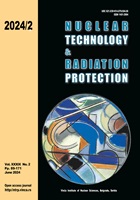
RADIATION HARDNESS TEST OF A SILICON DETECTOR AND PREAMPLIFIER OVER THE DESIGN LIFETIME FOR A REACTOR COOLANT LEAKAGE MONITORING SYSTEM
Pages: 89-97
Authors: Kihong Pak, Jongheon Kim, Yong Hyun Kim, Seung Beom Goh
Young-Sik Cho, and Yong Kyun KimAbstract
Radiation hardness tests were conducted on a silicon detector and preamplifier to develop a reactor coolant leakage monitoring system, which detects high-energy beta particles from 16N in the primary reactor coolant of nuclear power plants. Monte Carlo simulations were used to calculate the doses that would be absorbed on components over a 60-year design lifetime. The components were exposed to a 60Co gamma source with an activity of 2.4 kCi for 54 hours. The absorbed doses accumulated during the test were determined to be 0.99 kGy for the detector and 1.37 kGy for the preamplifier. During the test, the alpha count from a check source in the high-channel range disappeared in a high-dose-rate environment, and the gross gamma count decreased as the accumulated dose increased. The performance degradation of the detector and preamplifier was evaluated by comparing the alpha signals and background noise before and after irradiation. The energy resolution of the alpha signals in the high-channel range exhibited slight changes, whereas the electronic noise in the low-channel range increased by approximately 773 % for the irradiated detector and 17 % for the irradiated pre-amp. A method employing various low-level discriminator channels is proposed to mitigate noise effects in the monitoring system.
Key words: radiation hardness test, accumulative absorbed dose, silicon detector, reactor coolant, leakage monitoring
FULL PAPER IN PDF FORMAT (1,2 MB)
